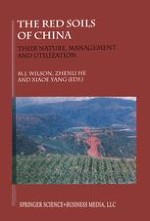2004 | OriginalPaper | Chapter
Physiological and Genetic Aspects of Crop Plant Adaptation to Elemental Stresses in Acid Soils
Authors : Xiaoe Yang, Weimu Wang, Zhenqian Ye, Zhenli He, Virupax C. Baligar
Published in: The Red Soils of China
Publisher: Springer Netherlands
Included in: Professional Book Archive
Activate our intelligent search to find suitable subject content or patents.
Select sections of text to find matching patents with Artificial Intelligence. powered by
Select sections of text to find additional relevant content using AI-assisted search. powered by
The world population is increasing rapidly and will likely to reach 10 billion by the year 2050 of which half will probably be living in the regions dominated by acid soils. The limited availability of additional arable land and the degradation of soil quality make food security a major challenge in the 21st century. Elemental toxicities and deficiencies are the major constraints limiting crop production in acid soils. Plant genotypes are known to differ greatly in their tolerance to elemental toxicity or deficiency in soils. In this paper, physiological and genetic mechanisms of crop plant adaptation to stresses of selected elements in acid soils are reviewed. Plant tolerance to toxicity stresses such as aluminum (Al) and manganese (Mn), and deficiency stresses of nitrogen (N), phosphorus (P), potassium (K), boron (B) and zinc (Zn) are closely related to the physiological processes of ion uptake, transport and re-distribution in the plant. In the last decade, considerable knowledge in the mechanisms of Al resistance or tolerance has been gained. The resistance of many plant species to Al toxicity is associated with increased root excretion of organic acids and with the involvement of specific anion transporters in the plasma membrane, whereas. Mnanganese tolerance seems to be mainly related to its distribution and compartmentalization in plant cells. The mechanisms of N, P, K, B, and Zn use efficiency in crop plants are not fully understood even although in recent years research on these elements has been increased considerably. The definition and expression of nutrient use efficiency (NUE) of the selected elements (N, P, K, B, and Zn) in crop plants and the physiological and genetic traits associated with the NUE are addressed in this context. To achieve sustainable crop production in acid soils, it is essential to increase crop plant tolerance to element stresses through genetic improvement and to further optimize soil nutrient availability and pest management so that adaptive and efficient farming systems an be established.
